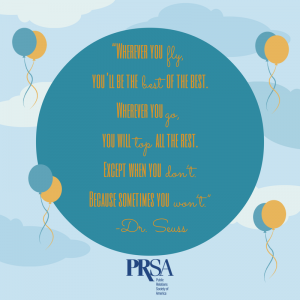In June of last year I was thrust into the role of leader. There was no warning, no time to research and prepare, no time to think about how I would lead, just a phone call that would turn all eyes to me for guidance and strength.
Although I had been leading PRSA National’s public relations team in one capacity or another for a year, I always had my leader to fall back on for support and take queues from when I was unsure. But, on that Friday morning in mid-June I suddenly found myself leading on my own.
I had to lead the delivery of devastating news to my team, my peers and other leaders of the organization. Additionally, I found myself being forced to put my own grief aside so that I could step into a position that had suddenly and unexpectedly become vacant.
As public relations professionals, we preach that crisis preparation is critical. We instruct our employers and clients to have a crisis communications plan ready for each and every scenario imaginable. In the days following that early morning call it wasn’t necessary for me to look at any specific page of the PRSA plan because my instincts kicked in and I simply knew what to do.
I have been managing staff since very early in my career. But only in the past few years, and more specifically this past year, have I come to understand what it means to lead. My resume is full of accomplishments from a flourishing career; I am well educated; and I give much of my time back to charitable organizations. All those things make me successful, but not necessarily a leader.
I have learned that a good leader may not be the most experienced or the most knowledgeable or even the person that graduated top of their class. A leader has the trust of those both above and below their pay grade. They inspire the people around them to be better, work harder and learn more. No decision they make is ever made lightly because they must stand behind those decisions with the full force and effect of their convictions.
I have long thought that the best CEOs are able to insulate themselves from the minutia of everyday operations so long as they surround themselves with others who have the skills they lack and whom they trust the most. They teach leadership and gain respect.
Leadership isn’t simply about being the boss; it’s about showing people what is possible and how to achieve those goals.
I have had many opportunities to learn from great leaders. All have taught me about winning and losing; success and failure; humility and arrogance, but I wasn’t able to recognize the most important lesson they taught me until push came to shove – that a leader jumps in without being asked, at all the wrong times, to ensure that things continue to happen.
Stephanie Cegielski, vice president of public relations, Public Relations Society of America








Well stated, Stephanie. Tough lessons learned “in the trenches.” You’ve done well, and I’m honored to count you both as a professional colleague and as a friend.